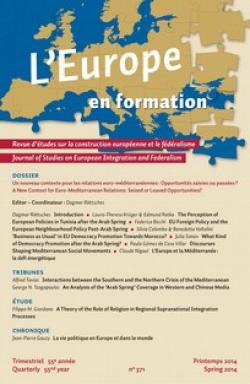Business as Usual in EU Democracy Promotion Towards Morocco? Assessing the Limits of the EU's Approach towards the Mediterranean after the Arab Uprisings

30/04/2014
This paper explains the ‘business as usual’ approach that the EU has shown in its democracy promotion strategies towards Morocco before and after the Arab uprisings. Despite the protests that shook the region, EU-Morocco relations have been constantly strengthened and Morocco continues to be portrayed as the champion of gradual reforms in both the economic and political realms and, thus, as an exceptional case, despite the limited progress that can be registered in terms of democratic reforms and human rights. How can we explain this situation? This paper argues that three factors account for this, namely the linkages between the international/regional context, Morocco’s domestic politics and the policies of EU member states. As such Morocco can be portrayed as a laboratory in which the EU is trying out its new approach to democracy promotion in the region given the country’s relatively stable situation.
-
Dati bibliografici
in L'Europe en Formation, an, 55, n° 371 (Spring 2014), p. 41-57 -
ISBN/ISSN/DOI:
10.3917/eufor.371.0041
Introduction
EU democracy promotion: a story of continuity?
Morocco: The ‘top of the class’?
Explaining continuities and change
1 - The regional security paradigm and the impact of the Arab spring
2 - Domestic dynamics in Morocco
3 - Member states’ foreign policies: France and Spain
Conclusion: The EU as a pragmatic democracy promotion actor



